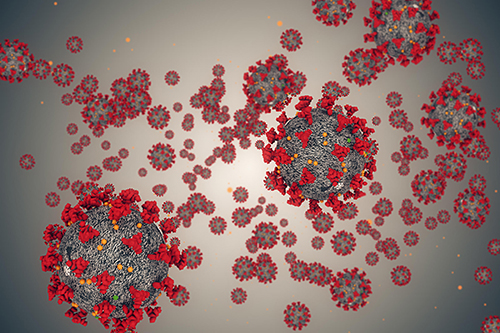San Luis Obispo County Health officials remain in near panic mode as the coronavirus pandemic continues to rack up high numbers of cases and deaths continue to occur, with the pandemic now in its third wave and 19th month.
Hope for the Hospitalized
With the County Health Department focused in on getting people vaccinated, Estero Bay News sought to find out what medicines and treatments people might receive if they get the virus and wind up in the hospital?
With just four hospitals countywide, and owned by just two companies, we asked the Dignity Health owned hospitals — French and Arroyo Grande Community — and those owned by Tenet Healthcare — Twin Cities and Sierra Vista hospitals — what a person could expect in the way of treatment should they unfortunately be hospitalized with COVID-19.
Dr. Thomas Vendegna, MD, the Chief Medical Officer at French Hospital Medical Center in SLO emailed their protocols, saying, “If a high-risk patient for progression to serious illness presents with a positive COVID test and significant symptoms within 7 days of their testing to the ER, then we can administer monoclonal antibodies.”
(That’s the same medicine Florida is seeking to administer to its residents, after Gov. Ron DiSantis established clinics across that state to administer the anti-body treatments.)
Once a person gets admitted to the hospital, Dr. Vendegna said, “then we utilize oxygen and steroids as the main therapy. If the patients have a marked elevation in their inflammatory markers then we can utilize a specific drug to block the response [tocilizumab or baricitinib].”
These drugs have potential side effects. “We monitor the patient’s clotting response and usually place them on some form of anticoagulation since COVID patients clot,” Dr. Vendegna, said. “Finally, if a patient progresses beyond this point we have mechanical ventilation with turning the patient in a prone position.”
At Tenet’s Hospitals, the protocol is roughly the same.
Dr. Irene Spinello, the head of the COVID ICU and Critical Care Units at Twin Cities Hospital in Templeton, agreed to a telephone interview with Estero Bay News. She said the treatment really depends on how early they catch the disease. “It depends on what stage they are in,” she said.
In early stages, less than 24 hours after symptoms appear, patients don’t require any treatment, so long as their blood oxygen level is 96% or higher. When the oxygen level drops, they administer supplemental oxygen. “That’s one of the best protections for the rest of the body’s organs,” Dr. Spinello said.
COVID-19 ferociously attacks the lungs. “The virus hurts the lung tissue,” she said, causing severe inflammation (swelling). “The lung tissue is no longer thin and pliable” and when that happens the tissue of the lungs has trouble absorbing oxygen that the rest of the body’s tissues and organs must have.
“Normally, we breathe oxygen in the air, which is about 21% oxygen,” Dr. Spinello said. “We give oxygen to get through the thick walls so the organs are not starved for oxygen and begin to shut down. We try to match the supply [of oxygen] with the demand” to minimize the damage done by the virus’ attack on the lungs.
This is all done in the infancy of a person’s illness, she explained. They treat the illness with the anti-viral, Remdesivir, which the FDA said can be effective and is approved for use against COVID-19.
“But after 5 or 10 days,” she said, “it no longer has the effect.” So early on, it depends on how soon someone seeks treatment, as to what medications are given, and in turn how severe his or her case is likely to become.
Their focus is on treating the inflammation, Dr. Spinello said. They too use steroids, which she said was “the most potent anti-inflammatory medication we have.”
She likened it to putting a wet blanket on a fire. They also turn to monoclonal antibodies to slow the “inflammation cascade.”
She likened this treatment to dominoes lined up in a row. If one domino falls the next and the next will fall too. If and when the lungs are badly inflamed, the patients devolve to having “Acute Respiratory Distress Syndrome” or ARDS.
“There is absolutely no treatment for that,” she said. At that point patients go on mechanical ventilators and receive 100-percent of their oxygen. That lack of oxygen escalates the severity with every organ that fails.
“Time and support is the only thing that gives the possibility of recovery.”
The Virus Hits Hard
Dr. Spinello, who has been a physician for 22 years, said this third wave of the virus “was horrendous,” and has taken a devastating toll on nurses and doctors trying to help patients. As health care officials have stressed, the vaccines help a lot.
Over 20 of the patients Dr. Spinello said she’s treated ended up on life support. “I see the sickest of the sick,” she said.
She recalled two cases of patients that were fully vaccinated, one had cancer and the vaccine did nothing for them; and the other was vaccinated early on in Mexico. The rest of her ICU patients, “are all unvaccinated.”
“If I got COVID and was fully vaccinated,” she said, “I would most likely spend time at home” to recover. “It’s the poor unvaccinated patients that get hit, and they get hit hard,” she continued. “This disease is no walk in the park; it really puts you down.”
Swine Flu Was Bad, Too
Dr. Spinello said the coronavirus is comparable to the swine flu epidemic of 2009. “The swine flu was in many ways worse,” she said. “But it was not so contagious.” They’re seeing 10 times as many patients now as with swine flu.
Asked what advice she would give to people, she used an analogy. “If I was a general leading an army, my most valuable asset is the people. If I see an army before mine dying to ‘take that hill’ I would not send my people to die. I’d say, ‘Let’s go around it.’”
She said she understands the notion of ‘freedom of choice’ and “I value that more than you can imagine.”
Coming from the former Soviet Union, she said there is “nothing more important than Freedom of Choice,” but it must be based on reliable information.
“Fighting COVID is a losing battle,” she said. “It’s better to prevent it.”
She sees the toll the disease is taking on her co-workers. “It’s so painful,” she said. “I have no idea of the numbers but I find nurses and respiratory therapists crying all the time.”
She was not surprised to hear her colleagues are reluctant to talk about their experiences. Dr. Spinello said that health care workers internalize the pain and try not to bring it home to their families and loved ones.
Booster Shots Available
On Sept. 28 the County Health Agency announced that booster shots of the Pfizer vaccine would be made available at the County Health Clinics in SLO, Paso Robles and Grover Beach.
The booster shots, which were only recently approved by the Food & Drug Administration (FDA), are also available at pharmacies and doctors’ offices.
But supplies are limited and the County said it was limiting these early booster shots to people at greatest risk — everyone over 65, people over 50 with certain high-risk medical conditions, and those “in long-term care facilities.”
High risk conditions include people with cancer; chronic kidney disease; lung diseases like COPD and asthma; dementia and other neurological illnesses; diabetes, pregnancy, and heart conditions; Down Syndrome; HIV; obesity, and liver disease plus several others.
Drug abuse — alcoholism, opioid and cocaine users — is also likely to make a potential case of COVID-19 more severe, according to information from the CDC website.
The County is also recommending younger people, 18-49 with these high-risk conditions get booster shots.
County Urging Vaccines
County Health Officer Dr. Penny Borenstein, continues to urge everyone to get vaccinated.
“We continue to encourage those who have not gotten their first or second doses of any vaccine [Moderna, Pfizer or Johnson & Johnson] to get those doses immediately to stem the spread of this virus,” she said. “These initial doses are the most important tools in protecting our community. And for those who are at the most severe risk of more severe outcomes of COVID-19, we’re also happy to now offer this additional boost of protection.”
COVID-19 Cases, Deaths Continue
On Sept. 24, the County announced that nine more people had died of COVID-19, ranging in age from their 60s to their 80s, bringing the death toll in SLO County from COVID-19 to 324.
The Health Department reported 243 cases of COVID-19 from Oct. 19 to the 24th. As of the 24th there were 33 people hospitalized with COVID and eight in the ICU.
“These losses are tragic and, unfortunately, further proof that we need to continue doing everything we can to battle against this deadly virus,” Dr. Borenstein said.
Vaccinated Rates
The rate of vaccinated people in SLO County would appear to be high. “More than 70.6% of eligible SLO County residents have received at least one dose of vaccine, and 63.2% are fully vaccinated,” the County said in a news release.
The vaccines continue to be available for free at County clinics, pharmacies and doctor’s offices and mobile clinics.
Readers are advised to speak with their doctors about the disease and the vaccine, and if you are cleared to go ahead with the shot, to go online to: myturn.ca.gov to schedule an appointment or call (833) 422-4255 to schedule an appointment at a County clinic. For hours and locations, see: www.RecoverSLO.org/Vaccine.
For updates on COVID-19 in SLO County, see: ReadySLO.org or call the Public Health Information Line at (805) 788-2903. Phone assistance is available at (805) 781-5500 Mondays-Fridays, from 8 a.m. to 5 p.m.
Testing Stepped Up
The County has reopened its COVID-19 testing site at the Morro Bay Vet’s Hall, 209 Surf St. Tests are available Mondays-Fridays from 7 a.m. to 7 p.m. but closed from 11-noon (for lunch) and from 4-5 p.m. (dinner break).
The site will be closed Monday, Oct. 11 for Columbus Day but reopen Tuesday, Oct. 12. You must register in advance call 1-888-634-1123.
Different test sites use different types of test, including the so-called “rapid” tests the results of which are available in minutes. See: www.emergencyslo.org/en/testing-locations to see which test is given where.
Testing and vaccinations are also being done locally at Morro Bay Drug & Gift and Urgent Care.




